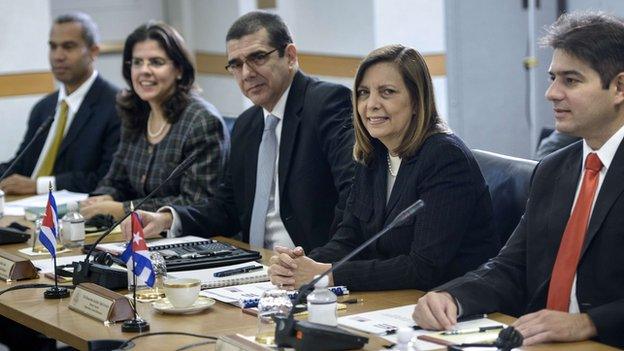Obama set for key Castro meeting in Panama
- Published
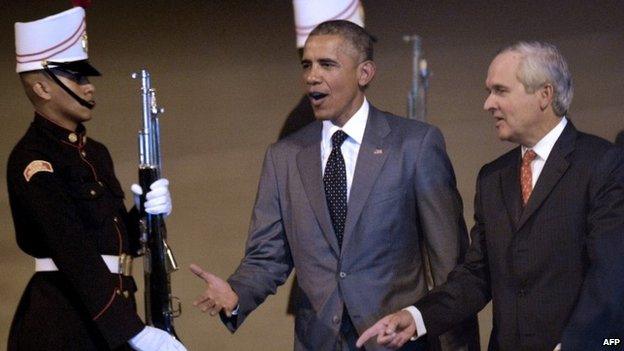
President Obama is in Panama, where he is expect to formally meet Cuba's Raul Castro for the first time
Delegations of 35 nations from North, Central and South America are gathering in Panama for what is being billed as a "historic" Summit of the Americas.
Not only will it be Cuba's first, it is also the first time former foes Barack Obama and Raul Castro will meet since a recent thaw in relations.
The two shook hands once before, at Nelson Mandela's funeral in 2013.
But their encounter in Panama is the moment all the photographers gathered here are waiting for.
The length and warmth of their handshake is set to be pored over by analysts for clues as to how their relationship is progressing since the surprise announcement on 17 December that they would seek to re-establish diplomatic ties.
On Friday, Mr Obama and Mr Castro spoke on the phone after arriving in Panama City, according to a Facebook post by Jorge Leganoa, the deputy director of Cuba's state-run National Information Agency.
He provided no additional details but White House officials confirmed to news agencies the call had taken place.
'On the margins'
The White House has been playing coy, saying that while there are no plans for any formal one-to-one meetings between the two presidents, there may well be an opportunity to "meet on the margins".
This is in keeping with the secrecy which surrounded the talks that led up to the December announcement.
It is something which seems to have worked well for the two sides and which they appear reluctant to let go of just yet.
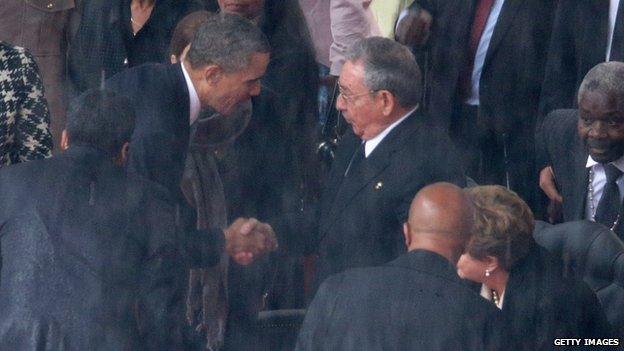
The US and Cuban leaders shook hands during Nelson Mandela's funeral in 2013
Hopes that they would have reopened their embassies by the time of the summit have already been dashed.
But one of the main hurdles on the road to re-establishing full diplomatic ties is tantalisingly close to being lifted.
The State Department has recommended Cuba be removed from the US list of countries which sponsor terrorism.
President Obama said on Thursday that all he was waiting for now was a recommendation from his advisers, leaving many expecting an announcement at the summit.
Fly in the ointment
But for all the warm glow around the the newly rekindled relationship between the two old foes, there is also nervousness about another meeting - between President Obama and his Venezuelan counterpart, Nicolas Maduro.
There have been tensions between the two countries for years but relations reached a new low last month.
On 9 March, President Obama signed an executive order imposing sanctions on Venezuelan officials suspected by the US of committing human rights abuses.
The order stated that the situation in Venezuela constituted "an unusual and extraordinary threat to the national security and foreign policy of the United States".
The wording caused outrage not just in Venezuela, which regularly accuses the US of interference and of fomenting coups against President Maduro, but also in other Latin American nations.
Venezuela's left-wing allies predictably denounced it, but there was also concern among members of regional group Unasur and countries which would not automatically jump to Mr Maduro's defence.
And more than 10 million people followed Mr Maduro's call to sign a document demanding its repeal.
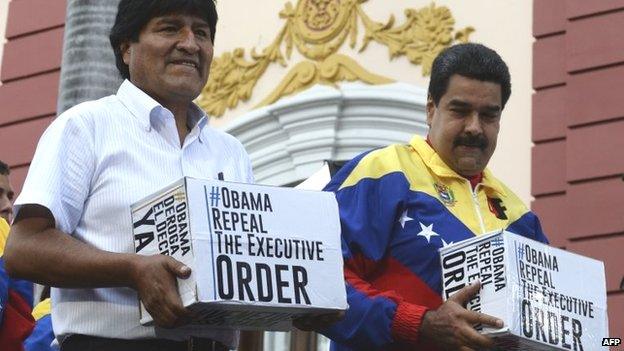
Ten million people have signed a petition - carried here by President Maduro (right) and Bolivia's Evo Morales - against the US order saying Venezuela posed a threat to US security
In the run-up to the summit, US officials have been trying to play down the significance of the order's wording, calling it "completely pro forma" and assuring Venezuela that "the US does not believe that Venezuela poses a threat to national security".
But Mr Maduro, who is himself not one to mince his words, is unlikely to pass up the opportunity to vent his anger on such grand a stage.
Just as with the handshake between Mr Obama and Mr Castro, the photographers will be at the ready.
- Published9 April 2015
- Published8 April 2015
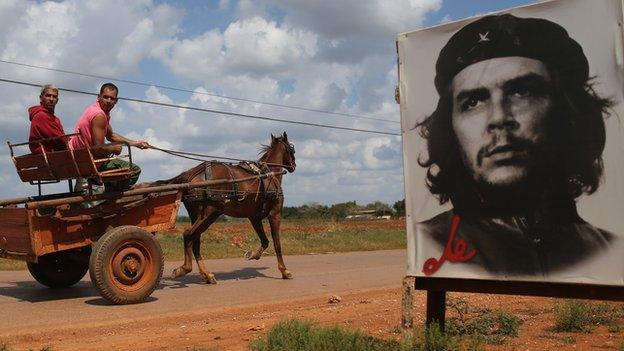
- Published27 February 2015
